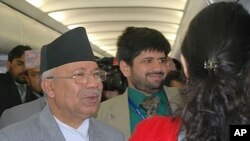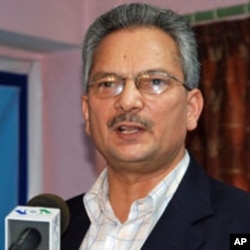Tens of thousands of Maoists' supporters are converging on Nepal's capital ahead of a May Day rally intended to topple the government of Prime Minister Madhav Kumar Nepal. In an interview with VOA News, Mr. Nepal outlined the conditions under which he is willing to resign.
Nepal's Prime Minister returned from a regional leaders' summit in Bhutan to find his government under increasing and intense pressure from the opposition Maoists.
In an exclusive VOA interview aboard the commercial flight taking him back to Kathmandu, Mr. Nepal said he is willing to leave his post if it will help expedite the peace process, including the drafting of a new constitution, which is mandated by May 28.
"If someone comes forward and there's an understanding over any questions then it's better that there be a national consensus government involving all the people," he said.
Maoist party vice chairman, Baburam Bhattarai, later told reporters the prime minister cannot set any conditions on his resignation and must dissolve what he termed the "puppet government."
"This government has been the biggest stumbling block for a forward solution to the current problem," he said. "So if the government is really serious then it should resign unconditionally."
Mr. Nepal's replacement would certainly be a Maoist or a prime minister of their choosing. The former rebels, despite winning the last national election in 2008, quit the government last year amid a dispute over how to integrate the former armed rebels into the army. The Maoists hold the most seats in the country's parliament.
Maoist deputy Bhattarai promises peaceful rallies in Kathmandu and other sites across the country Saturday. "If any untoward incident happens that will be against the policy of the party. So we'll mobilize thousands of volunteers to control such unruly elements and ensure peace," he said.
Prime Minister Nepal tells VOA News the army will only confront the Maoists on May Day if they threaten democracy with violence. "If there is a danger of the capturing of power and there is a danger of the violation of the peace process then the state has to perform on its responsibility [and call out the army]," he said.
Besides the unconditional resignation of Mr. Nepal, the Maoists are making other demands which they say, if not met, will result in a crippling and indefinite nationwide strike starting on Sunday.
The demands include halting a surge in consumer prices, scrapping a 1950 peace and friendship treaty with India and - in their words - "punishing the corrupt."
The Maoists fought a decade-long civil war until 2006 when a peace agreement was negotiated. That brought the Maoists into the political mainstream, leading to the formation of a democratic republic and the toppling of the country's 250-year old monarchy.





